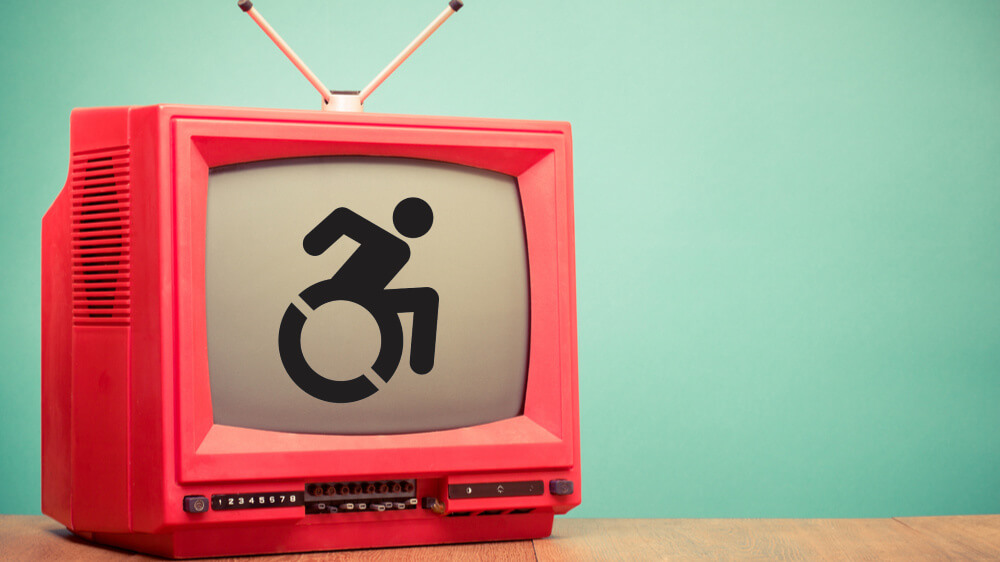An Open Letter to Hollywood: Inauthentic Representation of Disability Isn’t Representation At All
Growing up, I spent a lot of time thinking about what I wanted to be. It’s a fruitless endeavor at any age, really. But as a young disabled woman, my daydreams were harder to contrive than I imagine they were for my non-disabled peers. I didn’t have grand visions of being a movie star or a doctor or a big shot on Wall Street with all of the glamorous trappings that sometimes come with those professions.
Perhaps this is because I rarely saw anyone who looked like me on my screen. Watching disabled people on screen achieving their goals might have helped me build more intricate dreams of my own. When I say “disabled people,” I mean characters played by actors who live with a disability. As soon as I learn that a non-disabled actor is playing a disabled part, it reinforces for me that the world literally doesn’t think people with disabilities can play ourselves.
I might have been an actor, a lawyer, or a fashion designer. I’ll never know because I wasn’t allowed to see these things as a literal possibility. So, I had no idea I was allowed to fathom them in my mind for fun. It’s 2020 and Ali Stroker has a Tony Award for playing a character who is traditionally able-bodied. Most people would probably agree that time has run out for giving excuses for the lack of disability representation by disabled performers in the media. Yet, the excuses are still rampant.
In fact, when considering more than just numbers, most narratives about disability negatively represent the community. According to GLAAD’s 2019 “Where We Are On TV “report, characters with disabilities make up only 3.1% of regular characters on network TV. But this is nothing new.
Equally troubling is that according to the Ruderman Foundation’s “White Paper on Authentic Representation in TV,” in 2018 only 12 percent of all disabled characters on TV were played by disabled actors. This is an improvement from 2016 when that number was only five percent. But the progress isn’t as positive as it seems, because according to The New York Times, most of the storylines about disability on TV portray it in a negative light. Plus, The Times reported that in 2018, only two roles on the top 10 shows were authentically cast.
This lack of authenticity means I’m still in the same situation today as my 15-year-old self was years ago. It sends a horrible message to all people — disabled and non-disabled. If disabled actors can’t play themselves on TV, what can they do? Not work, apparently. If we aren’t allowing disabled actors to play disabled people, then what does society trust us to do? Teach children? Provide medical care? Defend criminals in court? People with disabilities can and do pursue these careers. But seeing that reality represented would make it easier for some disabled people to know what they can achieve. Representation isn’t enough anymore. We need to start demanding authentic representation in all forms of entertainment.
To that end, I’ve started to research the actors who play disabled characters when I see them on TV. If the actor isn’t disabled in real-life, I reach out to the production team on social media to ask why they’ve made this discriminatory choice. For example, when I saw that an abled actor was playing a man with Duchenne muscular dystrophy on FOX’s The Resident (currently one of my favorite shows), I tagged showrunner Amy Holden Jones on Twitter questioning the choice. The subsequent conversation was frustrating, to say the least.
Jones showed a complete misunderstanding of how important it is to listen, learn from, and respect disabled opinions to make true progress with disability representation on TV. Her refusal to acknowledge the problem with writing a disability storyline that requires a character to do physical stunts beyond a disabled actor’s ability was disheartening. “This role also required extensive stunts hanging on wires, physical risk. It’s easy to throw rocks,” she replied.
From my perspective, if a show has to use an abled actor, they have even more of a responsibility to at least hire a disability consultant on set. It was obvious from the dialogue and plot of the episode — in which a patient knows his life is ending and has a zero-gravity experience with the help of a doctor — that no steps were taken to make sure that the experience felt authentic to someone who has actually has Duchenne’s.
Jones claimed I wasn’t in possession of all of the “facts.” But the facts are that I’m a disabled woman who felt uncomfortable with the way my identity was being portrayed on TV. While Stephen Hawking had a zero-gravity experience in real-life (so the scenario is plausible), stunt doubling is also a real job. If there’s no way to do the stunts with a disabled actor and an abled stunt double, maybe rethink the story.
My intention wasn’t to attack Jones for one mistake. I had hoped to feel heard, but no matter what she claimed, her final response to me made it very clear she had absorbed none of my words at all. “Next time we’d do the same…This is the story we wanted to tell. We are proud of it.”
By that point in the conversation, my emotional energy was spent. But it made me realize that I need to be screaming louder about the importance of authentic representation in the media. Shows comparable to The Resident, like New Amsterdam, have a pristine history of casting people with many different disabilities authentically, so it’s possible. In my experience tracking disability representation on TV, a record like New Amsterdam’s is rare.
More common is what I’ve dubbed “the Artie effect” in reference to the paralyzed character on Glee, another FOX show that ran from 2009-2015. A disabled character is played by an abled actor and shows want credit for representation. This isn’t representing anyone — it’s extremely offensive. But at least Artie was a series regular. Most disabled characters on TV are guest stars who come in to give a nauseating inspirational lesson to other characters and viewers. Then they disappear or die.
Change doesn’t start by moving mountains and underrepresented communities know that. But we are tired and excuses don’t look good on you. Do you know what might look good? Authentic representation of the disability community. Our stories are so rarely told with respect and truth on TV that if you try even just a little bit, you might create something truly unique. In an industry full of reboots, revivals and recycled ideas, it’s a concept worth considering.
About Rooted In Rights
Rooted in Rights exists to amplify the perspectives of the disability community. Blog posts and storyteller videos that we publish and content we re-share on social media do not necessarily reflect the opinions or values of Rooted in Rights nor indicate an endorsement of a program or service by Rooted in Rights. We respect and aim to reflect the diversity of opinions and experiences of the disability community. Rooted in Rights seeks to highlight discussions, not direct them. Learn more about Rooted In Rights




SMH, instead of saying how proud she was of the story, and that she wouldn’t have changed any of it, Jones should have offered you a job as their disability consultant. Thanks for your insight and for trying to make these writers responsible to the disabled community!
Great piece! I’ve been hooked on “Silent Witness” —available on BritBox—about a forensic pathology team. It co-stars Liz Carr, who has a regular role as the technical genius on the team. She’s a disabled actor, disability activist and comedian, and one of the things I like is that sometimes she gets up from her wheelchair and stands. This is great because so many non-disabled folks don’t realize you can be in need of a wheelchair and also able to get out of it some of the time. She’s done a great deal to change how disabled folks are being represented in British TV. She left the show after the last season and has a role in a Hollywood movie, Infinite. I hope this inspires more directors and producers. Seeing her in that role was so affirming.
That’s one thing I do like about 9-1-1. One of the characters has a son with cerebral palsy, and the young boy portraying that character has cerebral palsy. Accurate representation. I remember a couple of shows from years back that had disabled characters like Life Goes On with a young man with Down’s Syndrome played by an actor with Down’s Syndrome, and an old cop show, T.J. Hooker, that had a lieutenant that was in a wheelchair played by an actor who was really in a wheelchair. Facts of Life had Geri Jewell and was one of the first shows to cast a disabled actress. To me, those shows were actually ahead of the times.